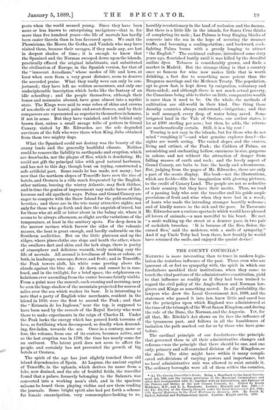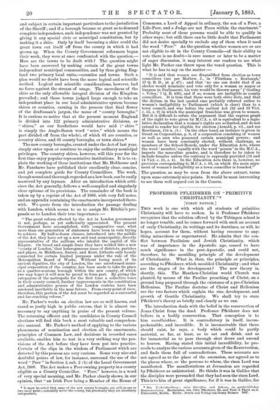THE COUNTY COUNCILS.*
NOTHING is more interesting than to trace in modern legis- lation the resistless influence of the past. Those even who are ignorant of, or feel no sympathy with, the spirit in which our forefathers moulded their institutions, when they come to touch the vital portions of the administrative constitution, yield to that influence as readily as if they had been trained to regard the civil policy of the Anglo-Saxon and Norman law- givers and Kings as something sacred. In all probability, the lawyers who drew the Local Government Act, 1888, and the statesmen who passed it into law, knew little and cared less for the principles upon which England was administered at the time of the triumph of the West Saxon Kingdom, and during the rule of the Dane, the Norman, and the Angevin. Yet, for all that, Mr. Ritchie's Act shows on its face the influence of the tyrannous past, and follows in all the humbleness of imitation the path marked out for us by those who have gone before.
The cardinal principle of our forefathers—the principle that governed them in all their administrative changes and reforms—was the principle that there should be one, and one only, primary and self-contained division of the Kingdom,— the shire. The shire might have within it many compli- cated sub-divisions of varying powers and importance, but no local administrative unit was allowed to exist outside it. The ordinary boroughs were all of them within the counties,
• (1.) The County Councillor's Guide. Being a Handbook to the Local Govern- ment Act, 1888, and the various provisions of the Municipal Corporations and other Acts incorporated with it; together with an Introduction, and Epitome of the Powers and Duties of the new County Councils. &c. Edited by Henry Hobhonse, M.P., and E. L. Fanshawe. London : Maxwell and Son. 1888.- (2.) The Election of tho County Councils under the Local Government Act, 1888; with Special Reference to the First Elections in January, 1839. By Frank B. Parker, Solicitor and Parliamentary Agent. London: Knight and Co. 1888. and subject in certain important particulars to the jurisdiction of the Sheriff ; and if a borough became so great as to demand complete independence, such independence was not granted by giving it any special civic or municipal constitution, but by making it a shire. Only by itself becoming a shire could the great town cut itself off from the county in which it had grown up. When the County Government reformers began their work, they were at once confronted with the question,— How are the towns to be dealt with ? The question might have been answered by making certain of the great towns independent municipal communities, and by thus giving Eng- land two primary local units,—counties and towns. Such a plan would no doubt have been the more logical and scientific method. Logical and scientific considerations, however, had no force against the stream of usage. The sacredness of the shire as the only allowable integral division of the Kingdom prevailed ; and those towns judged large enough to take an independent place in our local administrative system became shires or counties, earning in the process that final flower of the draftsman's jargon, the name of "county boroughs." It is curious to notice that at the present moment England is divided into 122 primary administrative divisions, or "shires," as our forefathers would have said (" shire" is simply the Anglo-Saxon word " scire," which means the part divided off from the whole), of which 61 are counties, or country shires, and 61 county boroughs, or town shires.* The new county boroughs, created under the Act of last year, simply enter upon or continue to enjoy the ordinary municipal privileges. The country shires, however, will this year for the first time enjoy popular representative institutions. It is to ex- plain the working of these institutions that Mr. Hobhouse and Mr. Fanshawe have published their excellently clear, concise, and yet complete guide for County Councillors. The work, though sound and thorough regarded as a law-book, can be easily mastered by any layman. After an introduction which criti- cises the Act generally, follows a well-compiled and singularly clear epitome of its provisions. The remainder of the book is taken up by a reprint of the Act of 1888, with very full notes, and an appendix containing the enactments incorporated there- with. We quote from the introduction the passage dealing with London, which seems to us to assign Mr. Ritchie's pro- posals as to London their true importance :— "The great reform effected by the Act in London government is not, perhaps, as yet sufficiently appreciated. The present Government have accomplished, with comparative ease, what more than one generation of statesmen have been in vain trying to achieve. By half-a-dozen clauses, introduced into the middle of the Act, they have set up a new and vast municipality, directly representative of the millions who inhabit the capital of the Empire. On broad and simple lines they have welded into a new county of London,' that heterogeneous mass of districts, parishes and places, in Middlesex, Surrey, and Kent, hitherto only loosely connected for certain limited purposes under the rule of the Metropolitan Board of Works. Without losing much of its ancient dignities, the city of London, the one unreformed muni- cipal corporation of the country, has been made to take its place as a quarter-sessions borough within the new county, of which (we may hope) it will now be proud to form part. By giving the ratepayers of the metropolis for the first time a collective voice in their county council, further improvements in the constitution and administrative powers of the London vestries have been rendered inevitable in the near future. From every point of view, therefore, this portion of the Act must be regarded as a successful and far-reaching reform."
Mr. Parker's works on election law are so well known, and stand so justly high in public esteem, that it is almost un- necessary to say anything in praise of the present volume.
The returning officers and the candidates in County Council elections will find this book a most valuable and comprehen- sive manual. Mr. Parker's method of applying to the various phenomena of nomination and election all the enactments, principles of Common Law, and decisions in recorded cases available, enables him to test in a very striking way the pro- visions of the Act before they have been put into practice. Certain of the slips in the wisdom of Parliament which are detected by this process are very curious. Some very nice and doubtful points of law, for instance, surround the use of the word " Peer" in Section 2, sub. 2 (b) of the Local Government Act, 1888. The Act makes a Peer owning property in a county eligible as a County Councillor. "Peer," however, is a word of very special meaning, and Mr. Parker clearly shows, in our opinion, that "an Irish Peer being a Member of the House of • It must be noted that some of the new county brvonghs are still, in one or two small point;, nominally under the county, but practically they are absolutely independent. Commons, a Lord of Appeal in ordinary, the son of a Peer, a Life-Peer, and a Judge are not Peers within the enactment." Probably most of these persons would be able to qualify in other ways ; but still, there can be little doubt that Parliament did not desire specially to exclude any of them when it used the word "Peer." As the question whether women are or are not eligible to sit in the County Councils—of their ability to vote there is no doubt—is sure sooner or later to be a matter of eager discussion, it may interest our readers to see what light Mr. Parker can throw upon the vexed question. This is what he has to say on the matter :— " It is said that women are disqualified from election as town councillors (see per Mathew, J., in Flintham v. Roxburgh,' 17 Q. B. D., at p. 47) ; and that no one can doubt that if an elector would nominate and vote only for a woman as mayor or burgess in Parliament, his vote would be thrown away' (` Gosling v. Veley,' 7 Q. B. 439), and if so, women are ineligible as county councillors. It is true that these were both °biter dicta, and that the dictum in the last quoted case probably referred rather to woman's ineligibility to Parliament (which is clear) than to a town council, and was before the earliest Act (32 and 33 Viet. c. 55, s. 9) in which the municipal franchise was given to women. But it is difficult to refute the argument that the express grant of the right to vote given by M.C.A. s. 63 is equivalent to a legis- lative declaration that a woman's rights are so limited, and do not extend to render her eligible for election (Arnold, p. vii., and see Rawlinson, 154 n. (b.) On the other hand, an instance is given in Grant on Corporations, p. 6, of a corporation consisting of women as well as men who possessed certain municipal powers ; and women have been constantly elected, without challenge, as members of the School-Boards, under the Education Acts, where the word member,' equally with the word 'person ' in the M.C.A., imports the masculine gender, and is therefore to be taken to include females unless the contrary is expressly provided (13 and 14 Vict. c. 21, s. 4). In the Education Acts there is, however, no provision corresponding to M.C.A. s. 63, on which the main argu- ment of woman's ineligibility as a town councillor is founded."
The question, as may be seen from the above extract, turns upon some extremely nice points. It would be most interesting to see them well argued out in the Courts.















































 Previous page
Previous page